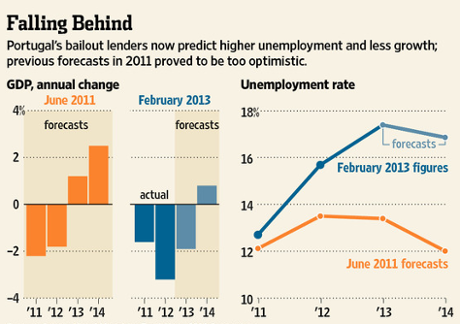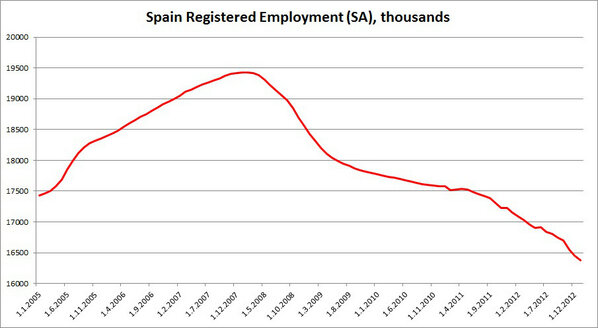http://globaleconomicanalysis.blogspot.com/2013/03/japan-central-bank-nominee-pledges-to.html
Sunday, March 03, 2013 8:26 PM
Japan Central Bank Nominee Pledges to Do Whatever Needed to Combat Deflation; Mother of all Pyrrhic Victories
Those who thought Japanese Prime Minister Shinzo Abe was not serious in his pledge to defeat deflation (and destroy the Yen in the process) need think again.
Haruhiko Kuroda (Abe's nominee to head Japan's central bank) pledges to do Whatever Needed to Combat Japan Deflation.
Haruhiko Kuroda (Abe's nominee to head Japan's central bank) pledges to do Whatever Needed to Combat Japan Deflation.
Haruhiko Kuroda, nominated to be the next Bank of Japan governor, said that a central bank under his leadership would do whatever is needed to combat 15 years of deflation.
“I would like to make my stance clear that we will do whatever we can do,” Kuroda, the president of the Asian Development Bank, said in a confirmation hearing in the parliament in Tokyo today.
Prime Minister Shinzo Abe’s nomination of Kuroda has raised expectations for more aggressive monetary easing to revive the world’s third-biggest economy after Masaaki Shirakawa exits the job on March 19. The opposition Democratic Party of Japan, the largest party in the upper house, has signaled it will back Kuroda, easing his passage through a split parliament.Mother of all Pyrrhic Victories
Kuroda said in an interview this month that falling prices exacerbate real debt burdens, and give an incentive to companies and households to postpone spending. Consumer prices excluding fresh food fell 0.2 percent in January. The price gauge hasn’t advanced 2 percent -- the central bank’s new target -- for any year since 1997, when a national sales tax was increased.
Any country determined to wreck its currency can indeed do just that. However, QE alone will not suffice if all the printed money sits as excess reserves. If QE fails, what's next? More bridges to nowhere?
Regardless, the idea that higher prices are a blessing is blatant stupidity. The last thing aging Japan citizens need is rising prices.
If anything, low interest rates are counterproductive because Japanese savers get zero % on their savings (having less interest income to spend). Sound familiar? It should because Bernanke has the same preposterous ideas.
Once sentiment turns (and it will - but I do not know when), Japan is going to have a hard time preventing the bottom from falling out of the yen. When that happens, the defeat of deflation is going to be the mother of all Pyrrhic victories.
Mike "Mish" Shedlock
Chart Of The Day: China’s $3.3 Trillion FX Reserves Could Buy All World’s Gold Twice
Submitted by Tyler Durden on 03/04/2013 - 07:52
China’s foreign currency reserves have surged more than 700% since 2004 and are now enough to buy every central bank’s official gold supply -- twice. The Bloomberg CHART OF THE DAY shows how China’s foreign reserves surpassed the value of all official bullion holdings in January 2004 and rose to $3.3 trillion at the end of 2012. The price of gold has failed to keep pace with the surge in the value of Chinese and global foreign exchange holdings. Gold has increased just 263% from 2004 through to February 28, with the registered volume little changed, according to data based on International Monetary Fund and World Gold Council figures. By comparison, China’s reserves rose 721% through 2012, while the combined total among Brazil, Russia and India rose about 400% to $1.1 trillion.
Sentiment Hobbled By Hawkish China Sending Futures Lower To Start The Week
Submitted by Tyler Durden on 03/04/2013 - 06:38
Earlier we reviewed the overnight plunge in China stocks, especially those related to the real-estate market in the aftermath of the latest move by the State Council to be far more hawkish than expected, in its effort to curb property inflation. The economic and market weakness that resulted has followed through to overnight US and European futures, even as peripheral bonds are trading roughly unchanged, surprising many who thought this weekend's Beppe Grillo statement on the future of Italian debt and presence in the Eurozone would be market moving: it wasn't as Grillo said nothing that he had not already made quite clear. In other, more recent economic news, UK construction PMI imploded to recession levels, plunging to 46.8 from 49.0, far below expectations and the lowest print since October 2009, setting the stage for much more Goldman-led reflation by the BOE. Also negative was the drop in the Eurozone Sentix Investor Confidence index which tumbled to -10.6 from -3.9 on expectations of -4.3, sending the EURUSD deep into 1.29 territory. It appears the Sentix excludes the soaring German confidence, which two weeks ago was the sole driver of all upside, not once but twice in one week. Today we get the first day of the sequester being digested by the market - this togetger with an empty macro calendar in the US means rumors and headlines will determine how far GETCO's algo push the stop hunts during the first and last 30 minutes of trading.
China Tumbles On Real-Estate Inflation Curbs: Biggest Property Index Drop Since 2008; Japan Downgraded On Abenomics
Submitted by Tyler Durden on 03/04/2013 - 03:28 As we have been warning for nearly a year, the biggest threat facing China has been the fact that contrary to solemn promises, the problem of persistent, strong and very much relentless real-estate inflation has not only not been tamed but has been first and foremost on the minds of both the PBOC and the local government. After all with the entire "developed" world flooding the market every single day with countless billions in new cheap, hot money, it was inevitable that much of it would end up in the mainland Chinese real estate market. And since both the central bank and the politburo are well aware that the path from property inflation to broad price hikes, including the all critical to social stability pork and other food, is very short, it was inevitable that the issue of inflation would have to be dealt with eventually. Tonight is that "eventually", when following news from two days ago that yet another Chinese PMI indicator missed, this time the Services data which slid from 56.2 to 54.5, the government announced its most aggressive round of property curbs yet. The immediate result was that the Shanghai Stock Exchange Property Index slumped by a whopping 9.3%, the steepest drop since June 2008, and pushing it down to -11% for the year. The weakness also spread to the broader market, with the Composite closing down 3.65% the biggest drop in months, and now just barely positive, at +0.2%, year to date. We expect all 2013 gains to be promptly wiped out when tonight's risk off session resumes in earnest.
As we have been warning for nearly a year, the biggest threat facing China has been the fact that contrary to solemn promises, the problem of persistent, strong and very much relentless real-estate inflation has not only not been tamed but has been first and foremost on the minds of both the PBOC and the local government. After all with the entire "developed" world flooding the market every single day with countless billions in new cheap, hot money, it was inevitable that much of it would end up in the mainland Chinese real estate market. And since both the central bank and the politburo are well aware that the path from property inflation to broad price hikes, including the all critical to social stability pork and other food, is very short, it was inevitable that the issue of inflation would have to be dealt with eventually. Tonight is that "eventually", when following news from two days ago that yet another Chinese PMI indicator missed, this time the Services data which slid from 56.2 to 54.5, the government announced its most aggressive round of property curbs yet. The immediate result was that the Shanghai Stock Exchange Property Index slumped by a whopping 9.3%, the steepest drop since June 2008, and pushing it down to -11% for the year. The weakness also spread to the broader market, with the Composite closing down 3.65% the biggest drop in months, and now just barely positive, at +0.2%, year to date. We expect all 2013 gains to be promptly wiped out when tonight's risk off session resumes in earnest.and looking at Europe......
| |||
|
| |||
|
| |||
|
http://www.guardian.co.uk/business/2013/mar/04/eurozone-crisis-eurogroup-cyprus-spanish-unemployment
In Italy, masks and meetings

The political situation in Italy remains masked (ahem) in uncertainty today.
Last night, centre-left leader Pier Luigi Bersani threw down a challenge to the Five Star Movement (M5S) warning leader Beppe Grillo that "we'll all go home" unless he backed a temporary government.
Speaking on Italian TV, Bersani declared that:
“He heads a movement that has a third of the Chamber, he needs to decide what he will do or we will all be sent packing, including Grillo.
Bersani's failure to win a majority in the Italian Senate, and his refusal to form an alliance with Silvio Bersluconi, leave the former communist dependent on some kind of agreement with M5S.
Grillo himself has taken to wearing a mask in public, in an effort to deter journalists from asking about his plans. Over the weekend he indicated that he might support a government that was committed to cleaning up Italian politics (a prospect he saw as somewhat remote)
The situation could develop today - Grillo is due to meet with his new parliamentarians to discuss strategy. And Bloomberg are reporting that M5S is considering abstaining in an up-coming confidence vote. That, if it happened, would help a minority government be created.
Here's the Bloomberg story:
Beppe Grillo’s senators-elect, who hold a blocking minority in Italy’s upper house of parliament, may consider staging a confidence-vote walk-out to allow a political rival to form a government and ease gridlock.Grillo’s 5 Star Movement is seeking to influence the program of Italy’s next government and would require policy concessions in exchange for a walk-out, said two senators-elect who declined to be identified because no deal has been made. Five Star won’t vote to support any government, they said.Walking out would lower the threshold for achieving a majority in the Senate confidence vote, making it easier to secure enough backing for a new government.
Eurozone investor confidence slides
The political mess in Italy has alarmed investors, whose growing confidence over the euro area has taken a knock this month.
The monthly eurozone investor confidence index, conducted by Sentix, has dropped to -10.6, down from -3.6 in February. That shows that investors across the eurozone have grown more nervous, reversing a six-month trend.
Sentix blamed the Italy election results:
The reason for this setback is obvious: it is the outcome of the election in Italy which has caused uncertainty over the country's future development to skyrocket....This has had a negative impact on the whole euro zone.
Chinese stock market tumble hits Europe
Most of Europe's stock markets have fallen this morning, after the main Chinese indices suffered an alarming sell-off.
Overnight the CSI 300 share index (which includes the biggest companies on the Shanghai and Shenzhen markets) slumped by 4.6%, its biggest daily fall since November 2010. The Shanghai Composite index shed 3.7%, with property companies the biggest fallers.
The selloff was prompted by a new clampdown on speculators, and plans to force second home owners to pay higher interest rates and larger deposits
Some traders also blamed an investigation into China's 'ghost towns' -- newly built residential areas where no-one actually resides -- by CBS News's 60 Minutes.
It showed images of vacant shops, empty streets, and half-built apartments where work appears to have suddenly stopped - suggesting that the Chinese property bubble may be bursting....
Why Portugal is seeking new baIlout terms
Last weekend's protests in Portugal were some of the largest seen in Europe during the crisis.
Organisers said that half a million people joined the demonstrations in Lisbon, with hundreds of thousands more attending other protests st some thirty cities (photos to follow).
The huge crowds in Lisbon's Praca do Comercio square chanted, "It's time for the government to go", and there were also slogans declaring "Austerity Kills" and "Screw the Troika".
Last week, Portugal's government insisted it could not change its austerity programme, saying it would be "rudderless in a sea of storms" if it couldn't rely on the support of the International Monetary Fund and the IMF.
However, Portual is expected to tell Eurogroup members today that it needs to be given an extra year to hit its bailout targets - a recognition that its recession is deeper than official forecasts.
As the Wall Street Journal explains here (with a handy graphic):
Portuguese officials acknowledge they overestimated tax revenues and underestimated how much money the country would have to spend on social benefits to the unemployed. They say Portugal has been hit hard by a deeper-than-expected slowdown in the euro zone, with which it does most of its trade.Labor unions and opposition parties have accused the government of blindly making spending cuts and raising taxes without realizing that they would contribute to a downward economic spiral.

Spanish unemployment rises again
Gloomy economic news from Spain this morning – the number of people registered as out of work has risen by 1.2% last month, breaking through the 5 million barrier.
The Labour ministry reported that the number of registered jobless in Spain rose by another 59,444, as the country's economy continued to contract.
The data doesn't include around 1 million people who are out of work, but not registered as such.
The austerity programme being implemented by the current government is widely blamed for stifling economic growth and driving people out of work.








No comments:
Post a Comment